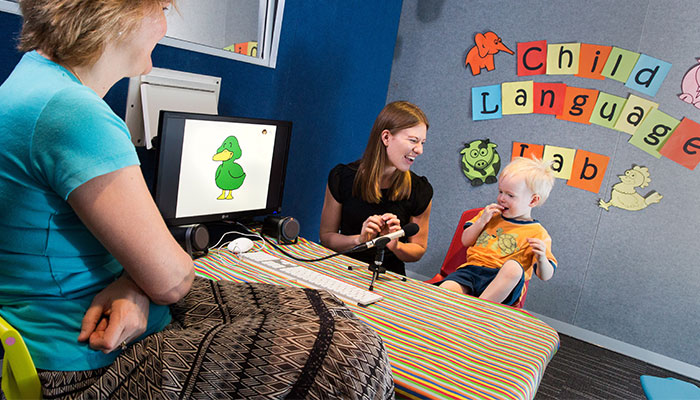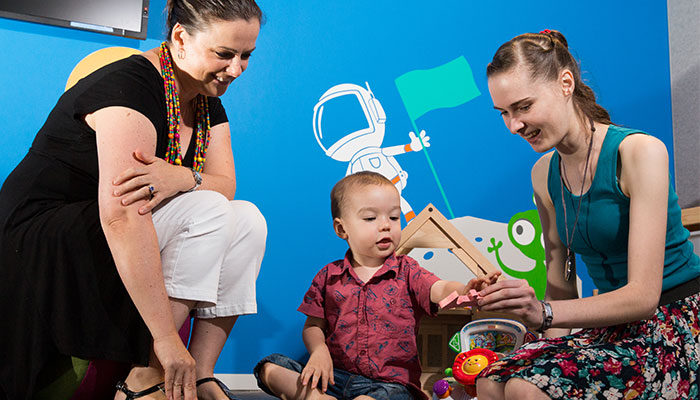If a five-year-old is unable to tell a simple story, it may be a sign they have a disorder affecting their language development, a Macquarie University linguistics researcher says.

Speech and language pathology rsearcher Dr Jae-Hyun Kim says with 10 per cent of children reaching primary school with some level of difficulty with language, the problem is more widespread than most people might imagine.
"Only a small portion of these children have language development problems as a result of medical conditions like hearing loss," Kim says. "The rest of them – 7 per cent of all children – have a clinical condition known as developmental language disorder. These children have language development problems without any obvious medical conditions.
"We're not talking conditions like stuttering – a study of children who stutter found that they can have better-than-average language skills. Developmental language disorder is a problem with using and understanding language."
In a paper published in Communication Disorders Quarterly, Kim and Department of Linguistics colleagues Dr Ben Davies and Dr Nan Xu Rattanasone found 80 per cent of the people surveyed had not even heard of developmental language disorder.
"That's a real problem, because if we're not aware of something, we can't start getting help," Kim says.
"We are now concerned that more and more children are reaching school with poor language skills.
"We've just gone through two years of lockdowns associated with COVID-19, where children haven't been consistently exposed to language‑rich environments like early childhood education centres.
"These children also had reduced opportunities for social interactions with parents, friends, neighbours and other people, but, in many cases, increased screen time."
While research is ongoing on the effects of screen time on children's language development, one of the main concerns is that when it increases, other important ways of learning, like free play and interaction with other children and adults, decreases.
Kim says the more screen time a child is getting, the less they are talking to a variety of people – and that variety is one of the keys to language development because they're being exposed to a range of different speakers and therefore different ways of speaking and using language.
Signs to watch for
Up to the age of five, language disorder can manifest as problems with spoken language, such as only being able to understand simple sentences.
Kim says one of the most prominent warning signs at age five is having trouble telling a fictional story in a coherent way.
If not resolved, it can often lead to literacy problems as the child gets older.
If your child was physically unwell, you'd take them to the doctor, and this is no different. Seek assistance from a speech pathologist early.
They might be reading aloud, but they have trouble understanding what they're reading. This lack of comprehension leads to other academic difficulties, including problems with learning and trouble at school, and it affects friendships with their peers and relationships with their teachers.
If it is picked up early, then specialised support from a speech pathologist can be effective in managing the problem. As children get older, however, it's not only the learning problems that need treatment, but the trickledown effects like anxiety and behavioural issues.
What can we do?
Kim says families and people who work with young children should make themselves familiar with the communication milestones children should have reached at each age.

For example, a three-year-old should be able to understand simple "wh" questions like what, where and who, and be able to sort items into groups when asked. As well as being able to tell a short, simple story, five-year-olds should be able to follow instructions with three parts and take turns in a conversation.
Most people understand the link between reading to children and developing language skills, but the emphasis should always be on interactivity – reading books with children rather than to them.
You can talk about the pictures, ask them what they think is happening and what will happen next, and count similar objects – all to create a conversation with them about the story you are reading.
Reading books together has been shown to benefit children's language skills, like learning new words, and children could benefit from regular book reading from as early as eight months of age.
Repetition is important in acquiring language skills, so parents shouldn't worry if their child wants to read the same book every night. A solution can be looking for different things to talk about to keep it interesting for both the child and the reader.
Local libraries have a huge range of resources available in addition to books. Story time offers an opportunity not only for children to interact with books, but to listen to a range of people talking. It also gives parents the chance to build a network and talk to each other.
Kim's main message for families is that if they think their child or grandchild is having a problem with language, don't just wait and see.
"If your child was physically unwell, you'd take them to the doctor, and this is no different. Seek assistance from a speech pathologist early," he says.
"It shouldn't only be up to parents to make sure children are meeting their language development goals, though. This is an issue we should be tackling together as a society.
"We need more support for early childhood education, more speech pathologists in early childhood education centres, and more funding for community libraries."
To learn more about how to support young children's language skills through books, request a free recording of a recent webinar hosted by MQ Health Speech and Hearing Clinic by emailing [email protected]
Dr Jae-Hyun Kim is a Senior Lecturer in the Department of Linguistics at Macquarie University, teaching in the Master of Speech and Language Pathology course






